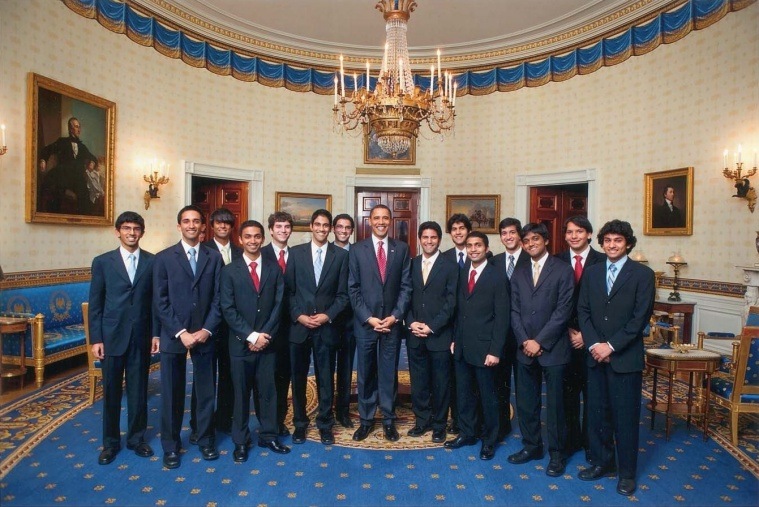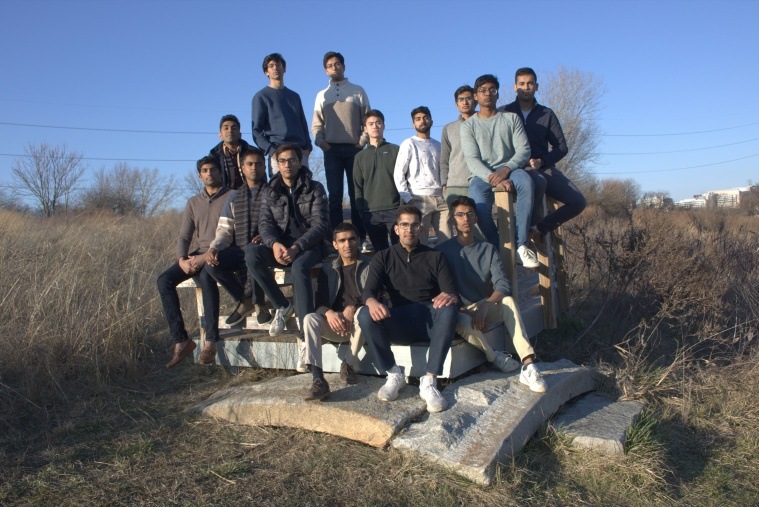Formed in 1996 by a group of South Asian students at the University of Pennsylvania, Penn Masala went on to perform for former US president Barack Obama at the White House and featured in the Hollywood film Pitch Perfect 2. Over the years, the ensemble has delivered deftly crafted mashups, singing the vocals and producing the background music without the aid of instruments.

Their latest album, Midnight Oil, embodies the South Asian-American identity of the acapella group.
“At its core, Masala is meant for everyone. Anyone can listen to our music, and hopefully, find some joy and beauty in it. If someone can say that the way you have done this mashup has made me feel seen… made me feel represented, I think that’s the entire point of what we do,” says Partha Rao, the director behind the new album.
The latest album, according to Rao, has allowed them to reach new audiences and enter new musical areas. With songs like Ragas of Malhar, which is an acapella version of Thyagaraja’s Kamalaapta Kula and Shankar-Ehsan-Loy’s Dhara Hogi, and a mashup of Justin Bieber and Ed Sheeran’s I Don’t Care with Tamil hit Kadhaippoma, the ensemble entered into the previously uncharted territory of classical music and new languages.
 Penn Masala went on to perform for former US president Barack Obama at the White House and featured in the Hollywood film Pitch Perfect 2. (Express Photo)
Penn Masala went on to perform for former US president Barack Obama at the White House and featured in the Hollywood film Pitch Perfect 2. (Express Photo)
With a semi-classical song at one end, the album also features the TikTok Medley of the most popular hits on the video-sharing app, representing the different tastes of the 14 members that make up Penn Masala. “It’s a reflection of what we like to listen to and the kind of music that we want to make as a group. What is beautiful about this album is that it’s not curated. It’s not a single concept. It’s everyone’s and it reflects the fact that we are an eclectic weird bunch of people,” says Rao.
Inspired by the phrase “burning the midnight oil”, as a metaphor for working through the dark, difficult times of the Covid-19 pandemic, the album also offers its listeners songs like Teri Mitti, Lakshya, Versace on the Floor and Paradise, among others.
Story continues below this ad
 Penn Masala has given a voice and sense of belonging to several South Asians born in the US or India. (Express Photo)
Penn Masala has given a voice and sense of belonging to several South Asians born in the US or India. (Express Photo)
The Covid-19 pandemic forced the members to “redefine” what Masala meant to them and break the mould. Before 2020, there was a ton of knowledge transfer between the graduating seniors and the newly-recruited juniors, explains Rao. “We didn’t have any of that because of the Covid restrictions. We lost out a lot on the things that had previously made Masala function and we had to redefine it for ourselves,” he says.
“The silver lining of the pandemic is that it gave us more time to really look inwards, think introspectively, about what kind of music resonates with us and what types of content express us as South Asian-Americans exploring our identities, says Sachit Gali, another band member.
The journey ahead
Penn Masala has given a voice and sense of belonging to several South Asians born in the US or India.
Gali says, “Growing up I really didn’t see people who looked like me or other South Asian-Americans who spoke the same language or had the same food as me. For 17 years, my life was pretty much like that. It was only when I came to Masala, I found a community of folks who had similar upbringings, and had the same interest in South Asian culture as me. It gave me the avenue to express that deep appreciation I have for South Asian and American culture, fusing it into one incredible mixture.” Gali was born to a Telugu family in the US.
Story continues below this ad
The group hopes to continue experimenting with their style. Raghunandan Raman, another member, says, “I think we will seek to expand the audience that we have garnered over the last 25 years, push beyond that and see to whom else we can market our music.”
 Penn Masala during one of their performances. (Express Photo)
Penn Masala during one of their performances. (Express Photo)
Ajay Kilambi, another member of his batch, adds, “India as a whole has so many different types of musical genres, like Carnatic or Hindustani, or different languages. So, we will be experimenting with those and seeing where we go.”
Penn Masala also aims to “create more original songs and to keep pushing our group creatively.” The group took up this challenge with the song Hazy in this album. Speaking about the experience, Gali says, “With an original, every aspect of the song comes from us, which means we can make it extremely suited to our group’s unique sound and add in new elements freely. At the same time, when creating an original, it’s much more difficult to develop a clear picture of how the song should sound in each section, but the end product itself is much more rewarding.”




 Penn Masala went on to perform for former US president Barack Obama at the White House and featured in the Hollywood film Pitch Perfect 2. (Express Photo)
Penn Masala went on to perform for former US president Barack Obama at the White House and featured in the Hollywood film Pitch Perfect 2. (Express Photo) Penn Masala has given a voice and sense of belonging to several South Asians born in the US or India. (Express Photo)
Penn Masala has given a voice and sense of belonging to several South Asians born in the US or India. (Express Photo) Penn Masala during one of their performances. (Express Photo)
Penn Masala during one of their performances. (Express Photo)































